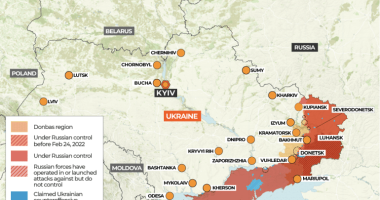Unlock the Editor’s Digest for free
Roula Khalaf, Editor of the FT, selects her favourite stories in this weekly newsletter.
The UK government borrowed more than expected in February as increased spending in part offset rising receipts, highlighting the fragility of public finances ahead of the general election this year.
Public sector net borrowing was £8.4bn in February, £3.4bn less than in the same month last year, according to the Office for National Statistics on Thursday. However, this was higher than the £5.9bn forecast by economists polled by Reuters.
In the first 11 months of the fiscal year to the end of February, borrowing was £106.8bn — £4.6bn less than in the same period a year ago and the lowest for four years in nominal terms.
Economists said government borrowing was on course to overshoot official Budget forecasts.
The Office for Budget Responsibility, the fiscal watchdog, forecast in March that borrowing would total £114.1bn in the fiscal year ending in March.
Ruth Gregory, economist at Capital Economics, said: “February’s disappointing public finances figures suggest that the OBR’s new 2023-24 borrowing forecast already looks too optimistic.”
“But this may not prevent the government from squeezing in another pre-election tax-cutting fiscal event later this year,” she added, based on the expectation that borrowing will fall faster beyond 2025-26 than current predictions.
“Government borrowing is on track to overshoot the recent Budget forecasts by a few billion pounds,” echoed Rob Wood, economist at Pantheon Macroeconomics.
Borrowing fell from last year on the back of more revenues from taxes, which were up 10 per cent. Gregory said the figures provided “evidence that tax receipts remained buoyant”.

However, higher public sector receipts were partially offset by increased spending, as last month the government made its final cost-of-living payment of the current financial year totalling about £2bn.
This payment, combined with higher spending on benefits linked to inflation, offset the reduced cost of the government’s energy support schemes, which have now largely ended.
In February the interest payable on central government debt was £6.8bn, down £1.1bn from last year and the lowest figure for that month since 2022.
Chief secretary to the Treasury Laura Trott said: “It was right that this government provided billions of pounds to support individuals and businesses during Covid, and pay half of people’s energy bills after [Russian President Vladimir] Putin’s invasion of Ukraine.
“Because of the difficult decisions we have taken, the economy is turning a corner, inflation is falling and wages are up.”
Earlier this week, shadow chancellor Rachel Reeves said a Labour government would ensure that “day-to-day costs are met by revenues” and would borrow only to invest.
Labour has also vowed to match Prime Minister Rishi Sunak’s fiscal rule that overall public debt should fall year on year as a share of gross domestic product by the fifth year of official forecasts.
Sunak has pledged to make progress towards his goal of scrapping employee national insurance contributions if he wins the election, which the chancellor has hinted could take place in October.
The ONS figures were released ahead of the Bank of England’s monetary policy decision on Thursday. The BoE is widely expected to keep interest rates at a 16-year high of 5.25 per cent, after holding them at its last meeting in February.
On Wednesday, official statistics showed that inflation fell more than expected to 3.4 per cent in February from 4 per cent in the previous month.
The ONS data showed that public sector net debt — or borrowing accumulated over time — was 97.1 per cent of gross domestic product, the highest since the early 1960s, highlighting the next government’s challenge in public finances.
Gora Suri, economist at the consultancy PwC, said: “This government and the next will face a Herculean task to both stimulate a flatlining economy and keep the public finances on a sustainable footing.”
Read More: World News | Entertainment News | Celeb News
FT









